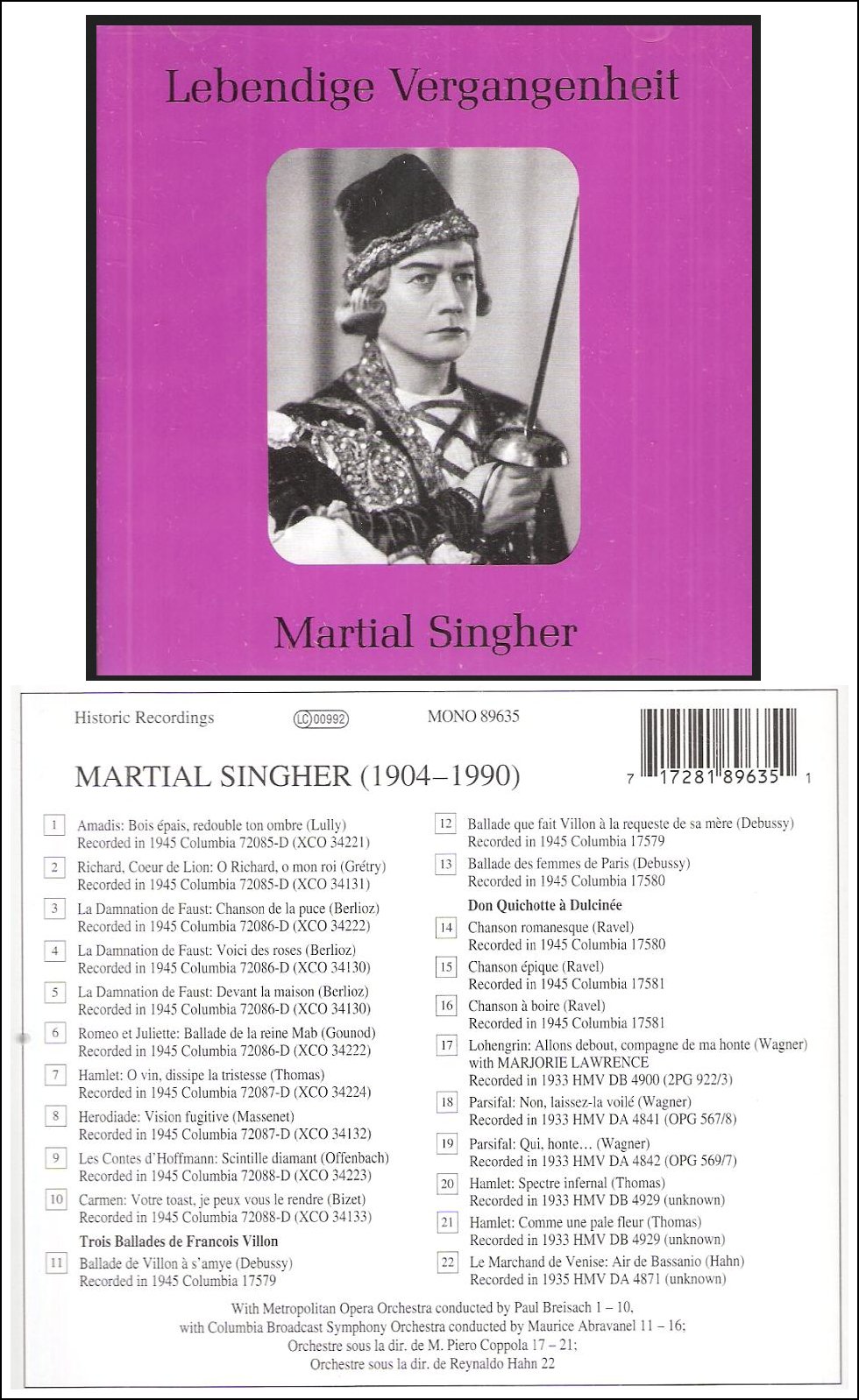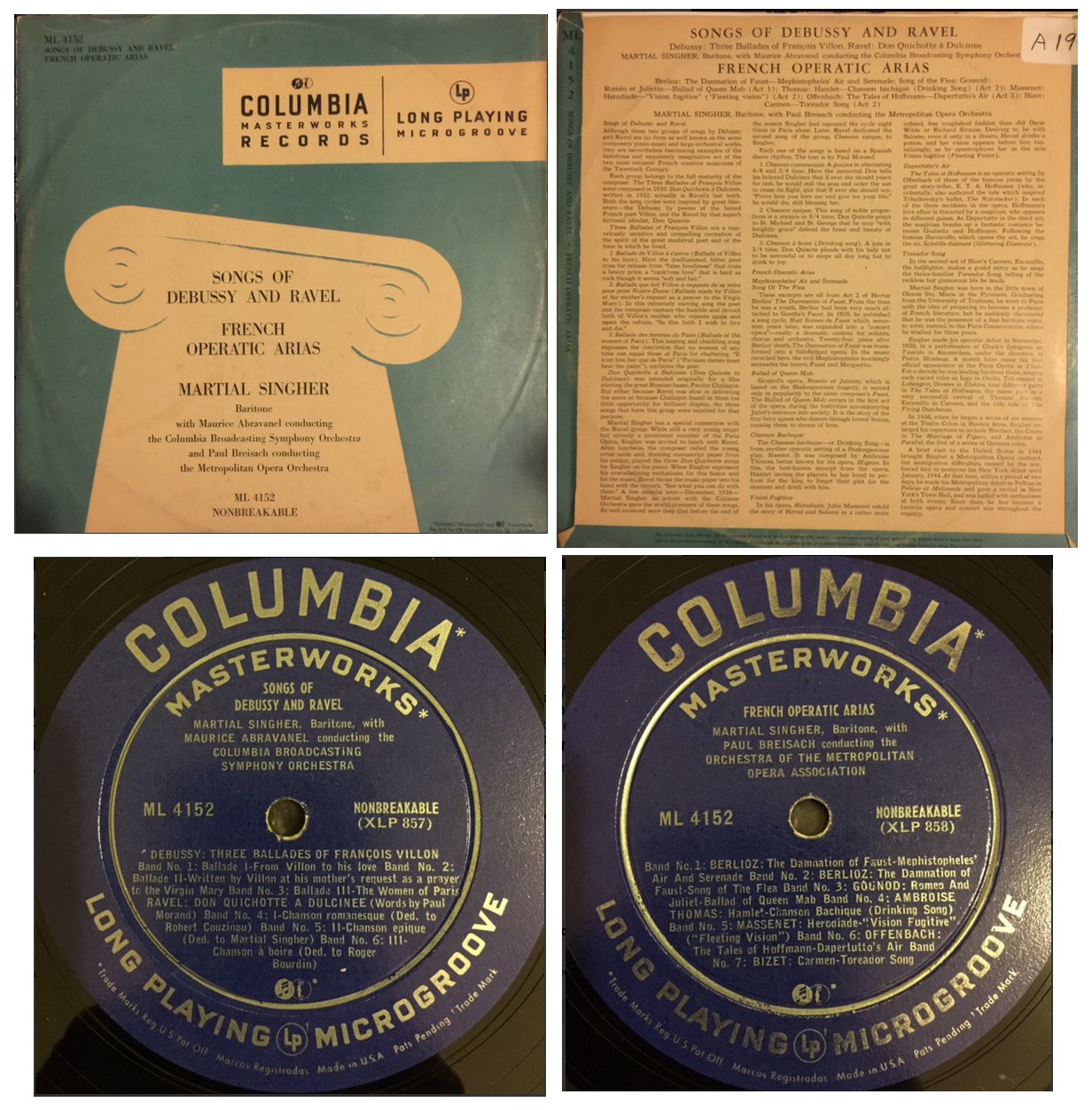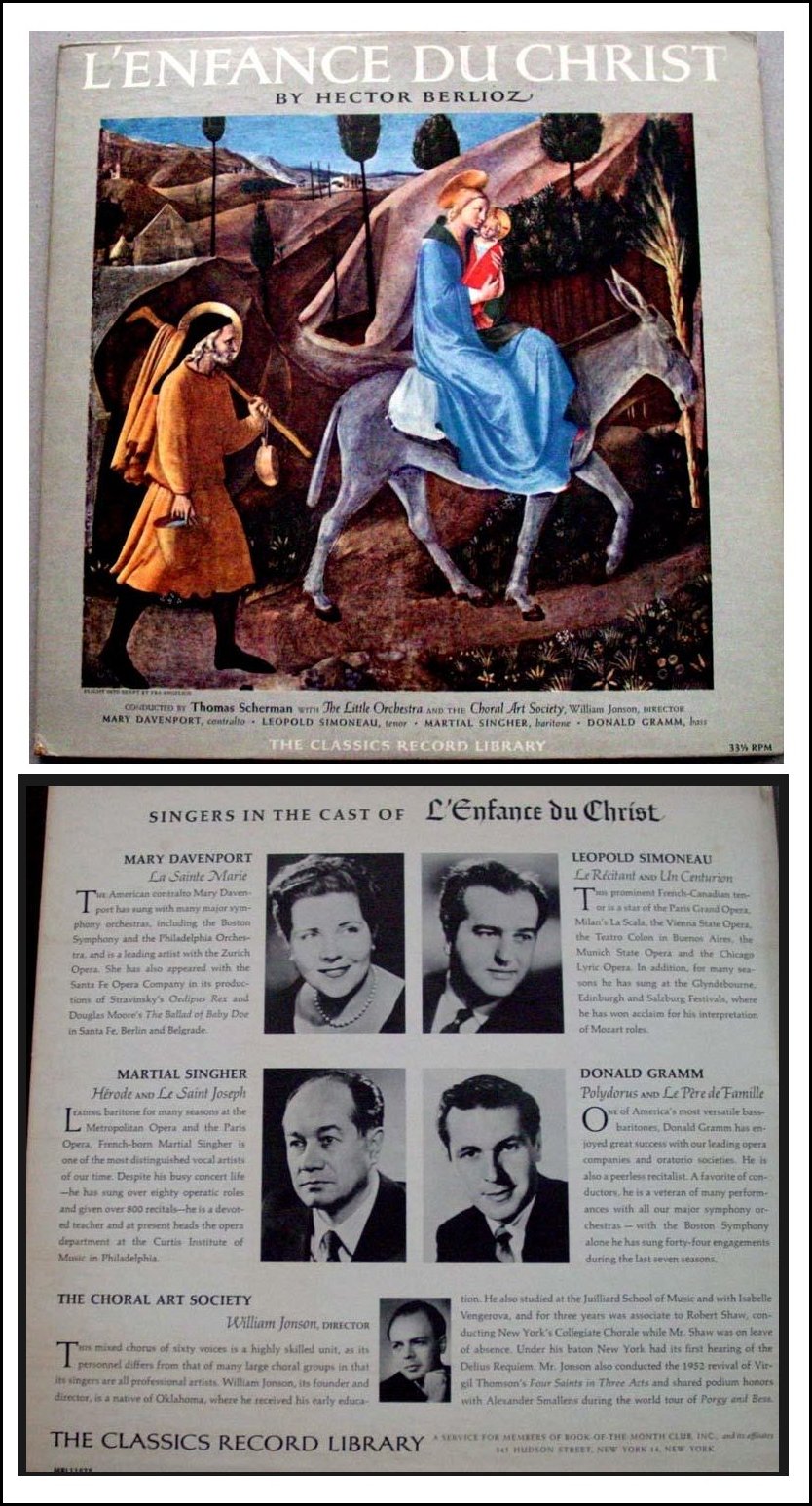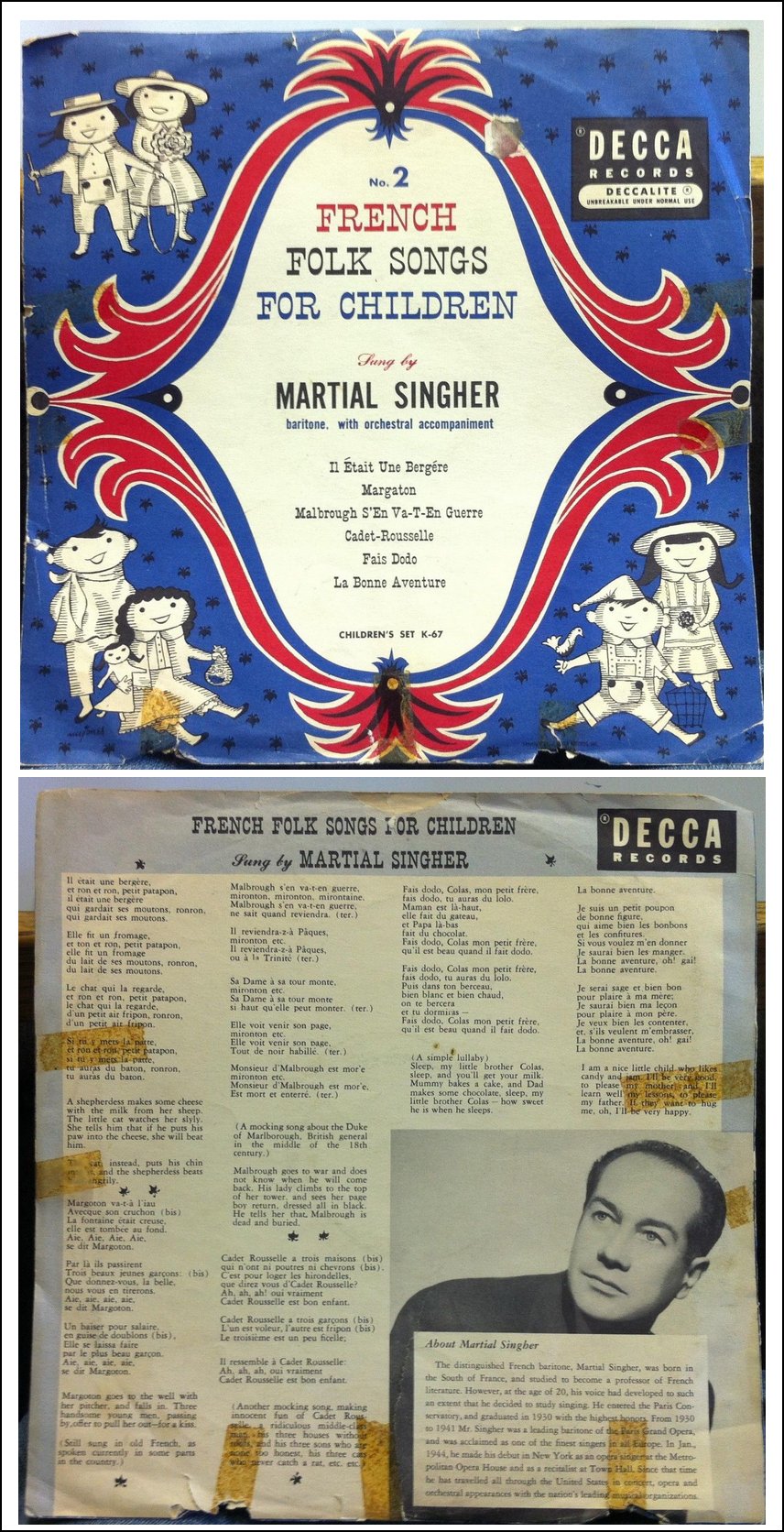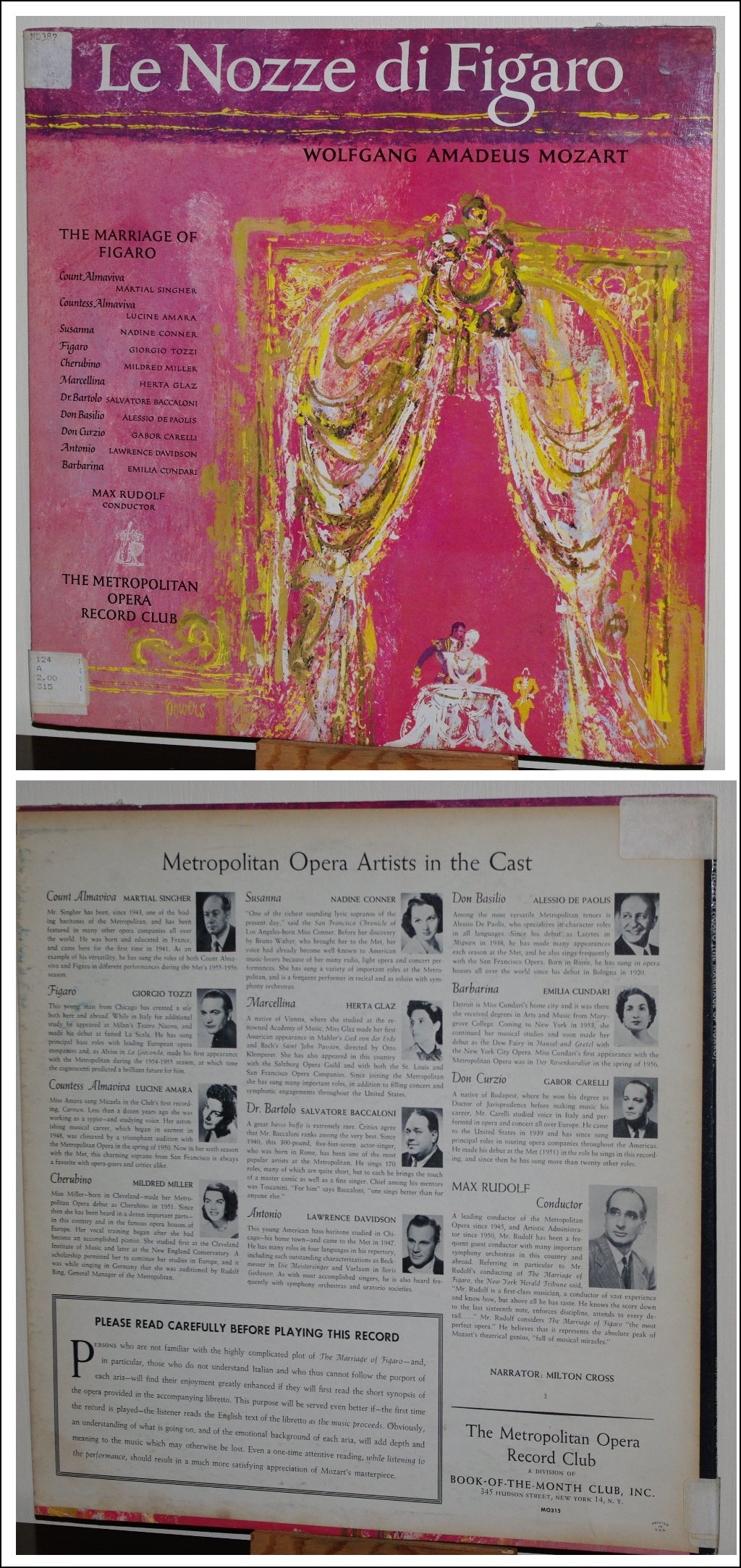[Note: This interview was first published in The Massenet Newsletter in January, 1986.
It has been slightly re-edited, and the photos and links have been added for
this website presentation.]
The Elegance That is Martial Singher
By Bruce Duffie
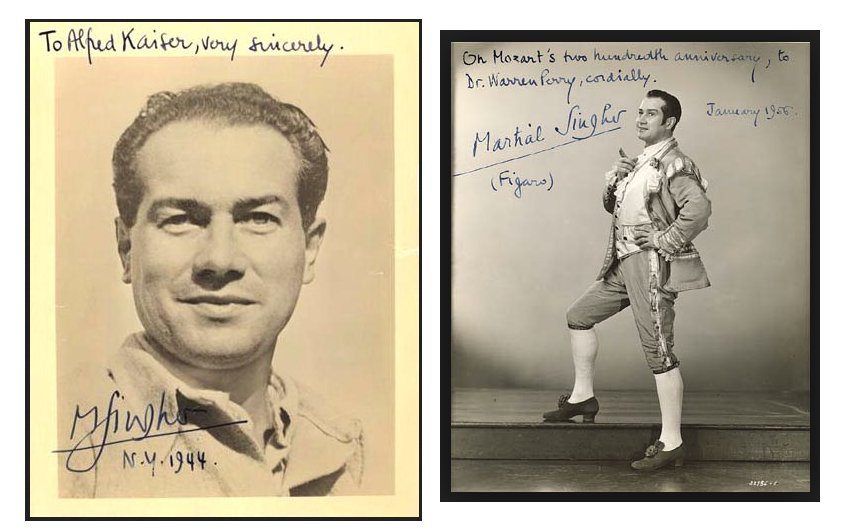
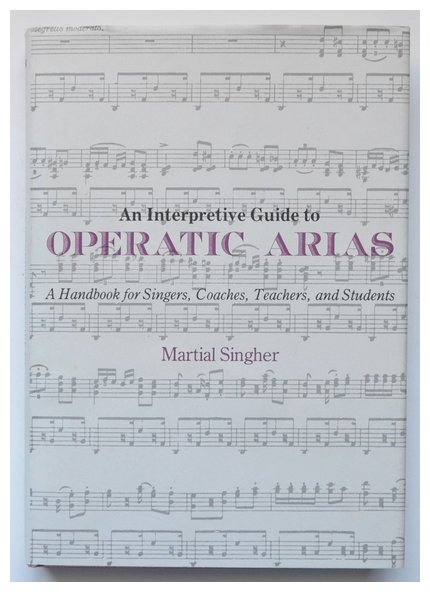
As a singer I have performed some hundred operatic roles as well as hundreds
of songs which is not really a different art. Whatever I have achieved
later in my music career has been due to the constant union of an often pedantic
study of words and music and an abandon as complete as possible to the inspiring
demands of the composer. (...) In the final analysis, all the
precise elements of any interpretation build up to one goal: to express.
The inspired mind and the sensitive heart of a good interpreter find in the
shape of the phrase, the inflection of the words, the right rhythm, the true
nuance, the rare color, the changes of pace, the silences, all they need to
convey to the audience the changing emotions of a role.
[From the book]
|
Those words above, which form a credo of sorts, were penned by Martial
Singher in the preface of his book, An
Interpretive Guide to Operatic Arias, published by Pennsylvania State
University Press. The subtitle is A Handbook for Singers, Coaches, Teachers, and
Students, but it also should be on the shelf on any fan of opera performance
or recordings. This is what Singher has learned as a student, what
he practiced as an artist, and what he now passes along to the next generation
of musicians.
Martial Singher was born in Oloron-Sainte-Marie, Basses-Pyrenees, in August
of 1904. Studying at the Paris Conservatoire from 1927-1930 brought
him first prizes in both operatic and opéra comique singing.
His roles in Paris included Wagner, Verdi, and various French composers until
1943 when he became a member of the Metropolitan. In New York he added
the four villains in Hoffmann, as
well as Pelléas and later Golaud. (He is one of the very few
singers who have done both on the stage.) He was also the first interpreter
of Ravel's Don Quichotte à Dulcinée.
The New Grove calls him a “fastidious
musician, and an elegant interpreter.”
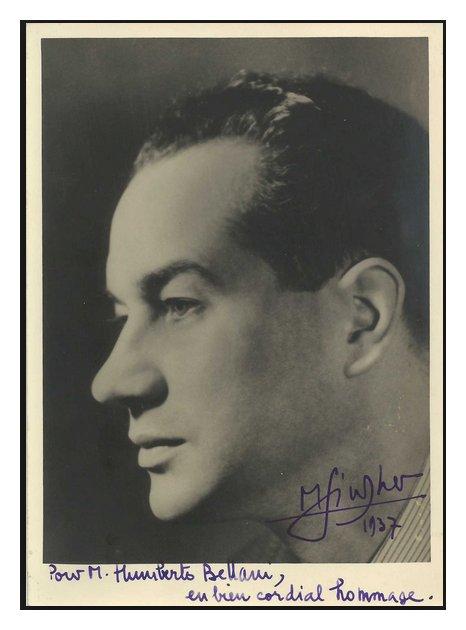 After retiring from a very active performing life, he continued his teaching
and headed the Department of Voice at the Curtis Institute in Philadelphia,
and later was Chairman of Voice and Opera at the Music Academy of the West
in Santa Barbara. Among his more well-known pupils are James King, Donald Gramm, John Reardon,
Louis Quilico, Benita Valente,
Thomas Moser, Judith Blegen, Thomas Hampson, and Rodney Gilfry.
After retiring from a very active performing life, he continued his teaching
and headed the Department of Voice at the Curtis Institute in Philadelphia,
and later was Chairman of Voice and Opera at the Music Academy of the West
in Santa Barbara. Among his more well-known pupils are James King, Donald Gramm, John Reardon,
Louis Quilico, Benita Valente,
Thomas Moser, Judith Blegen, Thomas Hampson, and Rodney Gilfry.
It was with eager anticipation that I was able to arrange an interview,
and in the course of a conversation which ran a bit more than an hour, we
discussed many things, including views on operatic practice both yesterday
and today, as well as some of his many roles. Several times he simply
referred to what he had said in his book, so those comments have been included
in this presentation.
I had asked about the inevitable mishaps which occur in every career, and
that is where we pick up the thread . . . . .
Martial Singher: It
happened in Werther in Philadelphia.
My Charlotte was Licia
Albanese, and at the beginning of the second act, the left side of the
set started falling upon us. I saw it out of the corner of my eye,
and was able to turn and hold it with both arms until some stage hands came
and saved us. That was the only time such a thing happened to me onstage,
though.
Bruce Duffie: While
we’re about it, tell me something of the character
of Albert.
MS: He is what is called
a ‘noble character.’ I don’t
think that the character has been very deeply carved by the librettist or
the composer. There are really only two characters in the opera
— Charlotte and Werther.
BD: Could a stage director
make Albert too weak?
MS: It could be done.
I don’t remember every having any qualms about it being
very sentimental at his return in the first act, very happy and then worried
but thinking he had a solution with the exile of Werther in the second act,
and then being decidedly murderous in the third act.
BD: Is Albert happy
that Werther commits suicide?
MS: He doesn’t
see it happen and doesn’t know about it. Probably
he would be a bit remorseful, or even deeply remorseful, but he had to save
his marriage and probably some kind of honor. When he gave the pistols
to be sent to Werther, he certainly knew what he was doing.
BD: You also sang in
Manon?
MS: Yes, I sang Lescaut.
I think that Manon is a masterpiece
with stronger and weaker points. Unfortunately, I don’t
think Lescaut is one of the strong points. However, it was very pleasant
to sing. There is not great vocal responsibility, but he has the opportunity
to swagger — which the singer always likes. [Laughs]
I sang it very often, but it is not possible to devote your soul and heart
to the role of Lescaut.
BD: You have to sing
it and get it over with?
MS: Right, but as elegantly
and pleasantly as possible. He could be a little bit touching in the
last scene.
BD: Would the character
of Manon been better off if she’d
met Brettigny before meeting Des Grieux?
MS: [Chuckles]
Here I can make reference to the novel which I know very well. It was
essential for Manon to meet Des Grieux. He stayed her only real love
throughout her life. Her life would not have been at all what it was
without Des Grieux at the beginning. After that, she went from temptation
to temptation, and success to success, but always returning to Des Grieux
at the moment things were not going well. He was really the solid base
of her life.
The interpreters of the opera
should remember that the roles of Manon and Des Grieux are written without
artificiality or exaggeration. The Chevalier stays passionately in love
with Manon despite her betrayals; she follows her irresistible yearning for
wealth, dragging him to dishonor and exile, yet loving him and him alone all
along. Even under the stress of such exceptional passions, but still
express themselves with as much simplicity as the operatic setting allows.
The role of Des Grieux calls for skill, intelligence, and versatility as
well as for power. It is one of the most demanding and rewarding roles
in the French repertoire. The sweetness of love should express itself
as freely as the fire of passion. The Rêve is a great opportunity to prove
it. The Gavotte is obviously
an insert, and in a way, slightly incongruous. It befits Manon’s
personality to urge all young people to listen to the call of love before
it is too late, as she has certainly done herself, even to warn her listeners
of the disappointments of love. It is hard to believe, however, that
her audience is not more experienced than she is, and that the advice coming
from her very young wisdom will be welcome by already well-informed ears.
Nevertheless, it is a pleasure to imagine Manon addressing herself to a sort
of intimate circle kneeling or sitting around her, and trading her grand airs
for a friendly confidential tone, speaking to women more than to men.
[From the book]
|
BD: Is Manon
a virgin when we first see her in Act I?
MS: I believe so, and
the novel lets us believe so.
BD: How different is
the libretto from the novel?
MS: Enormously different.
The novel has many more dark moments, and the character of Manon is, at certain
moments, quite vile. That never appears in the Opéra. It
was softened to fit the Opéra Comique. You know that when Carmen was given at the Opéra Comique,
there was tremendous objection to the fact that someone was killed onstage.
So there couldn’t be something too tragic in Manon. She dies, but she is not
killed, and she is not seen in her worst moments.
BD: So if Massenet
had been writing for the Opéra rather than the Opéra Comique,
would he have used more of the tragic elements?
MS: I do not know whether
it would have been desirable in any way. The opera is extremely well-balanced
the way it is.
* *
* * *
BD: Is opera art or
is opera entertainment?
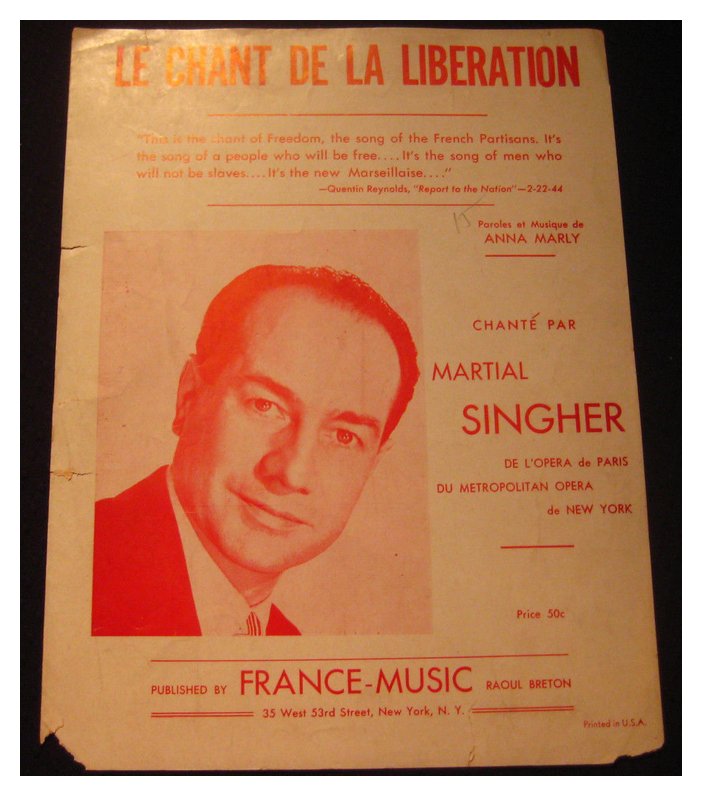 MS: I believe that it’s both.
I believe very deeply that it is art because opera is not only what the singers
do onstage; it is the ensemble. It is possible to make a great art with
the orchestration of an opera. I have a recollection of Maurice Abravanel conducting
Roméo et Juliette here at
the Music Academy of the West. The very young and brilliant performers
in the orchestra were sometimes given to taking the music a little lightly
because they were only playing for an opera, and I remember Maestro Abravanel
becoming very stern and telling them, “Don’t
you realize that in one page of Roméo
et Juliette there is more music than in all your Scarlatti sonatas?”
MS: I believe that it’s both.
I believe very deeply that it is art because opera is not only what the singers
do onstage; it is the ensemble. It is possible to make a great art with
the orchestration of an opera. I have a recollection of Maurice Abravanel conducting
Roméo et Juliette here at
the Music Academy of the West. The very young and brilliant performers
in the orchestra were sometimes given to taking the music a little lightly
because they were only playing for an opera, and I remember Maestro Abravanel
becoming very stern and telling them, “Don’t
you realize that in one page of Roméo
et Juliette there is more music than in all your Scarlatti sonatas?”
BD: I hope they then
had more respect for the music in front of them.
MS: I think so.
I have had the great privilege to work with most of the great conductors of
my era, and I have seen how the music of an opera can be made into something
of the highest level of art. Then comes the singer, and then it can
be more entertainment and less art. Then comes the stage director and
more and more in our days the focus is pushed to entertainment. It may
be good in some way and ridiculous in other ways.
BD: Is the stage director
taking too much upon himself?
MS: That depends on
the stage director. There is no doubt that he has become a much more
important person than he was 30 or 40 or 50 years ago. It may be for
the best. I can remember when I came to the Met in 1943, very little
attention was paid to the staging. Some of the sets were extremely
shoddy, and the action was totally uninteresting. People would move
onstage according to a certain rhythm, but without much purpose. It
has been changed radically, and that is for the best. There has been
enormous improvement in both the concept of the sets and their realization,
and the lighting.
BD: Is this because
we now expect it, having enjoyed the cinema and TV where technical advances
are brought out all the time?
MS: That is the way
it should be. Opera should not stay behind the other media.
BD: Then opera is not
a museum?
MS: In a way it is.
There are two things — the original text, and the interpretation.
The original text should never be changed, but the use made of it lends to
a great number of possibilities. And if the modern ways can be added
to the old traditions without destroying them, so much the better. But
it is a matter of individual taste.
BD: Are all the operas
in the standard repertoire masterpieces?
MS: The judge of the
value of an opera changes with the years. We are speaking of Massenet,
and they are now giving works by him which I had not even heard of when I
was a young, or even a middle-aged singer. I had never heard of Cendrillon and suddenly it is everywhere,
so it must be better than people thought in my time. I remember during
one of my last years of activity, I gave a recital in San Francisco, and the
local critic came to my dressing room afterward to inquire about Esclarmonde. It was going to be
given there the following season, and he asked me if I knew it. I said
that certainly I knew it — I had sung the part of the
Bishop. He asked me what it was like and I said it was miserable, it
was nothing. Well, Esclarmonde
was given the next season and was a great success, and the production was
taken to the Met.
BD: Why did you think
it was a miserable opera?
MS: Because that was
how I felt when I was singing it. I thought that the music had absolutely
nothing new. It was something we knew about Massenet, and the subject
was ridiculous — once more one of those enchantresses
who take hold of a noble knight — and
all that seemed very uninteresting to me.
BD: So was it a mistake
to bring it back, or did you find something new this time when you heard it?
MS: No, it is the type
of opera that banks on one superstar.
Who can be sure that some day
Massenet’s Hérodiade
will not make a triumphant comeback on some great operatic stage?
The story, the score, and the staging require on the part of an opera company
an effort almost comparable to that of a production of Aïda, and few ‘grand
operas’ include so many spectacular arias for all of
the principals in the cast — tenor, soprano, baritone,
contralto, and bass — or such
large choral scenes and diversified dance interludes. When I sang Hérode
in the early 1930s in France, I felt that I had to meet some of the most
exacting demands a composer can make on his interpreters. Shortly afterward,
the opera went into a coma from which it has as yet not recovered. But
other works of Massenet have known a similar fate, yet are fully alive.
[From the book]
|
BD: Are
there operas languishing on library shelves which should be produced by the
major companies?
MS: I’m
not a researcher, but there is one opera I would love to see brought to
America called Marouf (1914) by
Henri Rabaud (1873-1949). If I call Manon a masterpiece, then I would call
this one also a masterpiece. It is in a lighter vein, but the music
is lovely and the story is very nice.
* *
* * *
BD: Let me ask about
one other Massenet role — Athanaël.
MS: Yes, that was the
role in which I made my debut at the Paris Opéra. Think of that
— I was two months out of the conservatoire and they took the risk
to give me the role of Athanaël for my debut. I was all of twenty-six!
BD: It was a well-founded
risk!
MS: [Laughs]
Well, it happened to work. I like the part very much, but that is another
one I thought I would never see again when I came to America.
BD: Why?
MS: Because I don’t
think it is a very good opera. As always in Massenet, there are extremely
good parts and extremely good scenes, but there is all the music which is
so cheap. However, the relationship between Thaïs and Athanaël
is very well treated and becomes very moving. I saw the production in
San Francisco and it was very well given. The two principals were excellent,
and the suggestion by the sets was nice.
The aria O mon miroir fedele from Thaïs is a great showpiece, dangerous
for a tasteless performer given to exaggeration but perfect for a skillful,
sensitive, and discriminating young woman.
[From the book]
|
BD: Thinking
of Thaïs, did you ever see Mary Garden onstage? [See my article,
Massenet, Mary Garden, and the Chicago Opera
1910-1932.]
MS: Yes, once, in 1930
I believe. It was her last year at the Opéra Comique and she
was in Alfano’s Risurrezione
(1904). I was a student and I did not know who she was. I remember
she was wearing a flaming red wig and looked very small beside René
Maison. Later, I had the privilege to appear a few times at her side
during one of her several farewell tours in America. She was lecturing
and I had been hired to sing a Debussy group at intermission. So I had
the privilege of knowing her quite a bit, and she was a very interesting person.
* *
* * *
BD: Are you optimistic
about the future of opera?
MS: I think it is in
better shape in America now than at any time since I came in 1943. There
are many more operas in many more places than before, and there are more
and more excellent young artists.
BD: Do you feel that
young artists today are more prepared than they were thirty or forty or fifty
years ago?
MS: It depends on what
you call preparation. Young American artists have always been much better
prepared in musical ability and intellectual knowledge than any other artists.
There is a primitive character of many European singers, and American artists
bring to the stage more intellectuality. I don’t
know whether that is good for opera. What keeps me happy and alive is
the fact that I have been remarkably successful in inspiring young American
singers in my way of thinking.
= = = =
= = = = = = =
[Note: This issue of The Massenet
Newsletter contained both my interview with
Singher as well as the one with Bidú Sayão,
hence the following comment at the end...] These two interviews
with Bidú Sayão and Martial Singher are the first in a series
which spotlights the earlier generation. It has been my very great
pleasure during the last few months to locate several of these distinguished
artists, contact them and arrange for a conversation. I get very excited
when this happens, and I hope this enjoyment comes through in print.
Next time, my conversations with soprano Helen Jepson and conductor
Maurice Abravanel. Needless to say, I am very grateful to the Massenet
Society for allowing me to gather, prepare, and present these bits of operatic
history.
© 1985 Bruce Duffie
This conversation was recorded on the telephone on April 20, 1985.
This transcription was made later that year, and published in The Massenet Newsletter in January, 1986.
It was slightly re-edited, photos and links were added, and it was posted
on this website in 2017. Because the sound on the tape was poor, I quoted
some of his responses when presenting programs of his artistry on WNIB in
1989 and 1994.
To see a full list (with links) of interviews which have been transcribed
and posted on this
website, click here.
To read my thoughts on editing these interviews for print,
as well as a few other interesting observations, click here.
* * * *
*
Award -
winning broadcaster
Bruce Duffie was with WNIB, Classical
97 in Chicago from 1975 until
its final moment as a classical station in
February of 2001. His interviews have also
appeared in various magazines and journals since
1980, and he now continues his broadcast series on WNUR-FM, as
well as on Contemporary
Classical Internet Radio.
You are invited
to visit his website
for more information about his work, including
selected transcripts of other interviews, plus
a full list
of his guests. He would also like to call your
attention to the photos and information about his grandfather,
who was a pioneer in the automotive field more than a century ago.
You may also send him E-Mail with comments,
questions and suggestions.



 After retiring from a very active performing life, he continued his teaching
and headed the Department of Voice at the Curtis Institute in Philadelphia,
and later was Chairman of Voice and Opera at the Music Academy of the West
in Santa Barbara. Among his more well-known pupils are James King, Donald Gramm, John Reardon,
Louis Quilico, Benita Valente,
Thomas Moser, Judith Blegen, Thomas Hampson, and Rodney Gilfry.
After retiring from a very active performing life, he continued his teaching
and headed the Department of Voice at the Curtis Institute in Philadelphia,
and later was Chairman of Voice and Opera at the Music Academy of the West
in Santa Barbara. Among his more well-known pupils are James King, Donald Gramm, John Reardon,
Louis Quilico, Benita Valente,
Thomas Moser, Judith Blegen, Thomas Hampson, and Rodney Gilfry.  MS: I believe that it’s both.
I believe very deeply that it is art because opera is not only what the singers
do onstage; it is the ensemble. It is possible to make a great art with
the orchestration of an opera. I have a recollection of Maurice Abravanel conducting
Roméo et Juliette here at
the Music Academy of the West. The very young and brilliant performers
in the orchestra were sometimes given to taking the music a little lightly
because they were only playing for an opera, and I remember Maestro Abravanel
becoming very stern and telling them, “Don’t
you realize that in one page of Roméo
et Juliette there is more music than in all your Scarlatti sonatas?”
MS: I believe that it’s both.
I believe very deeply that it is art because opera is not only what the singers
do onstage; it is the ensemble. It is possible to make a great art with
the orchestration of an opera. I have a recollection of Maurice Abravanel conducting
Roméo et Juliette here at
the Music Academy of the West. The very young and brilliant performers
in the orchestra were sometimes given to taking the music a little lightly
because they were only playing for an opera, and I remember Maestro Abravanel
becoming very stern and telling them, “Don’t
you realize that in one page of Roméo
et Juliette there is more music than in all your Scarlatti sonatas?”